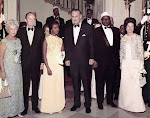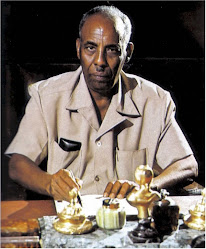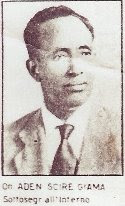Book: Lidwien Kapteijns, Clan Cleansing in Somalia: The Ruinous Legacy of 1991. Philadelphia: University of Pennsylvania Press, 2013. 336 pages.
***

“We’re going to get it on because we don’t get along.” —Mohamed Ali,
Rumble in the Jungle.
“The past is never dead. It’s not even past.”—William Faulkner, Intruder in the Dust.
***
When the current Somali president, Hassan Sh. Mohamoud, has recently visited Minnesota, he gave what seemed to be an inspiring and upbeat speech to that state’s Somali community. Then, he committed a faux pas when he admonished the audience to forget about the past, what happened in 1991 and afterward, and not to dwell on it. The reaction of those who heard the speech ranged from those who wanted to move forward and build on the positives to those who had hard time swallowing the fact that what happened in 1991 could be readily dismissed after so many lives were lost, properties confiscated, and thousands expelled from their homes. The president was depicted as an insensitive leader bent on concealing the truth rather than seeking a judicious way of redressing the wrong. Such is the legacy of 1991 and its deleterious effect on the minds of many Somalis, even after 22 years.
Professor Lidwien Kapteijns’ book, Clan Cleansing in Somalia, exactly cautions Somali politicians not to engage in empty rhetoric about concealing and brushing off the “ruinous legacy” of 1991. Kapteijns, who teaches history at Wellesley College in the United States, is no stranger to Somali studies. She has extensively written about Somalia and speaks fluent Somali. As long as the memories, wrongdoings, and injustice of that period are not fully acknowledged and publicly addressed, she argues, Somalia will remain in a state of conflict and unable to engage in meaningful reconciliation and nation-building.
Something drastic and major happened in 1991 in Mogadishu and other parts of the south that was tragic: an unprecedented violence. Whereas Somalis had history of killing each other—a clan against clan—what took place in 1991 after the collapse of Siad Barre’s brutal regime, writes Kapteijns, was “analytically, politically, and discursively something new, a transformative turning point and key shift that has remained largely unaddressed (and has been purposefully denied and concealed) both in the scholarship about the Somali civil war and in the political efforts at social and moral repair.” Various mechanisms were used to conceal, deny or downplay the 1991 tragedies. The Western media, for instance, failed to uncover the killings and raping of innocent people in Mogadishu, and when foreign reporters visited Mogadishu at the apex of the civil war, they were chaperoned by the operatives of the United Somali Congress (USC). Kapteijns adroitly cites a case of several Western reporters reporting from Mogadishu on one fateful day whose narratives almost resembled each other. It was obvious that these journalists were in the same convoy when they were reporting the carnage in Mogadishu. The problem was compounded by poor academic and political memoir writings that failed to grasp the gravity of the situation in Mogadishu. Moreover, moderate leaders of the USC engaged in covering up the killings. It was only a decade and half later when warlord Ali Mahdi publicly admitted the atrocities committed in 1991.
This was a campaign based on collective punishment of one clan, and, hence, it was “namely that of clan cleansing, in a new political context and with a new dominant discourse.” In fact, argues Kapteijns, it was a communal violence in a way because it involved ordinary people such as friends, acquaintances, and neighbors targeting others based on being members of the wrong clan. The violence was not done randomly but instead it was carried out in a well-thought-out manner that pitted, not a government force against an organized armed group but, a common people against common people. Kapteijns, though, makes it clear that it was not clans that did the killings in Somalia but rather people who used the name of clans to kill, maim and rape.
Book: Lidwien Kapteijns, Clan Cleansing in Somalia: The Ruinous Legacy of 1991. Philadelphia: University of Pennsylvania Press, 2013. 336 pages.
***
“We’re going to get it on because we don’t get along.” —Mohamed Ali, Rumble in the Jungle.
“The past is never dead. It’s not even past.”—William Faulkner, Intruder in the Dust.
***
When the current Somali president, Hassan Sh. Mohamoud, has recently visited Minnesota, he gave what seemed to be an inspiring and upbeat speech to that state’s Somali community. Then, he committed a faux pas when he admonished the audience to forget about the past, what happened in 1991 and afterward, and not to dwell on it. The reaction of those who heard the speech ranged from those who wanted to move forward and build on the positives to those who had hard time swallowing the fact that what happened in 1991 could be readily dismissed after so many lives were lost, properties confiscated, and thousands expelled from their homes. The president was depicted as an insensitive leader bent on concealing the truth rather than seeking a judicious way of redressing the wrong. Such is the legacy of 1991 and its deleterious effect on the minds of many Somalis, even after 22 years.
Professor Lidwien Kapteijns’ book, Clan Cleansing in Somalia, exactly cautions Somali politicians not to engage in empty rhetoric about concealing and brushing off the “ruinous legacy” of 1991. Kapteijns, who teaches history at Wellesley College in the United States, is no stranger to Somali studies. She has extensively written about Somalia and speaks fluent Somali. As long as the memories, wrongdoings, and injustice of that period are not fully acknowledged and publicly addressed, she argues, Somalia will remain in a state of conflict and unable to engage in meaningful reconciliation and nation-building.
Something drastic and major happened in 1991 in Mogadishu and other parts of the south that was tragic: an unprecedented violence. Whereas Somalis had history of killing each other—a clan against clan—what took place in 1991 after the collapse of Siad Barre’s brutal regime, writes Kapteijns, was “analytically, politically, and discursively something new, a transformative turning point and key shift that has remained largely unaddressed (and has been purposefully denied and concealed) both in the scholarship about the Somali civil war and in the political efforts at social and moral repair.” Various mechanisms were used to conceal, deny or downplay the 1991 tragedies. The Western media, for instance, failed to uncover the killings and raping of innocent people in Mogadishu, and when foreign reporters visited Mogadishu at the apex of the civil war, they were chaperoned by the operatives of the United Somali Congress (USC). Kapteijns adroitly cites a case of several Western reporters reporting from Mogadishu on one fateful day whose narratives almost resembled each other. It was obvious that these journalists were in the same convoy when they were reporting the carnage in Mogadishu. The problem was compounded by poor academic and political memoir writings that failed to grasp the gravity of the situation in Mogadishu. Moreover, moderate leaders of the USC engaged in covering up the killings. It was only a decade and half later when warlord Ali Mahdi publicly admitted the atrocities committed in 1991.
This was a campaign based on collective punishment of one clan, and, hence, it was “namely that of clan cleansing, in a new political context and with a new dominant discourse.” In fact, argues Kapteijns, it was a communal violence in a way because it involved ordinary people such as friends, acquaintances, and neighbors targeting others based on being members of the wrong clan. The violence was not done randomly but instead it was carried out in a well-thought-out manner that pitted, not a government force against an organized armed group but, a common people against common people. Kapteijns, though, makes it clear that it was not clans that did the killings in Somalia but rather people who used the name of clans to kill, maim and rape.
The 1991 violence was not created out of vacuum. It was Barre who started using political violence to punish entire clans. The government’s policy was “using clan sentiment to exacerbate competition, conflict and grudge among Somalis.” Two incidents stand out. First, it happened in 1978-1982 in the Mudug, northeast, and Nugaal regions. Barre’s forces killed innocent people in those regions, poisoned wells, and starved thousands of people. There is also the incident that involved the killings of 82 high- ranking military officers in Jigjiga during the Ethiopian War, an act overseen by Barre’s minions; General Mohamed Ali Samantar and General Mohamed Nur Galaal. This happened after a failed military coup, aptly called “the Majertein coup,” which led to the execution of 17 officers. Oddly, 16 of the 17 killed were Majertein. The other non-Majertein conspirators, interestingly, had their sentences commuted to prison terms.
Second, it was the well-written and widely-covered violence of 1988-1989 in the northwest and Togdheer regions when the regime bombed cities, killing and dislocating thousands of Isaac people.
When Barre was overthrown, the USC, according to Kapteijns, adopted a policy that “defined as mortal enemy of all Somalis encompassed by the genealogical construct of Daarood, which also included the president.” Many of those targeted by the USC and its allies (the SNM and the Rahanwein-based SDM), argues Kapteijns, had nothing to do with the Barre regime, but their crime was they shared the president the same clan. On the other side of the coin, the 1991 violence also had another dimension: some high-ranking officials in Barre’s regime were spared after the defeat of the dictator. Kapteijns mentions individuals such as Hussein Kulmiye Afrah (vice president), Abdiqassim Salad Hassan (interior minister), General Jilicow (head of security in the Benadir region) Mohamed Shaikh (finance minister), Abdullahi Adow (minister of presidency and former Somali Ambassador to the United States) who had largely benefited from their long association with Barre, found themselves unharmed and, in fact, were embraced by the leaders of the USC, whereas persons who belonged to Barre’s clan but never benefited from his regime got killed, robbed, or expelled because they were from the wrong clan.
Kapteijns chronicles the atrocities committed against minority groups such as, for instance, the Bravanese, that had suffered tremendously in the hands of both the USC and the Daarood-based SNF. A resident of Brava, a coastal town in the south, complained about how the rule in his hometown had changed hands on numerous occasions. “One group leaves then the next group comes,” he lamented. “They loot and take away your possessions. I can’t tell one from the other; they are like ants of the same color.”
Lidwien Kapteijns’ book is an important addition to Somali studies. She uses popular poems, radio broadcasts, and extensive oral interviews to analyze the genesis, fomenting, and perpetuation of hate speech, and the employment of code words. The book is at its strongest when Kapteijns delves into the use of poetry and oral recordings to explain the violence that had engulfed Somalia in early 1990s. This is a-must-read book for every Somali who wants to know what happened in 1991. It is especially important for Somali leaders who want to bring a lasting change to Somalia because the process of uncovering the truth and dealing with it is only the beginning of the healing process.























.jpg)










